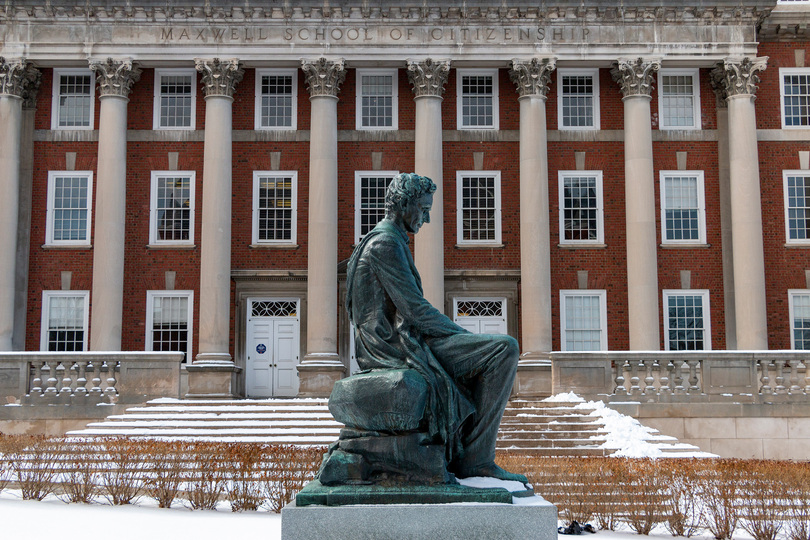Dialogue meeting emphasizes listening to bridge Israel-Palestine divide

Francis Tang | Daily Orange File Photo
Tuesday’s virtual discussion, “Dialogue Meeting: Stories from the Israeli-Palestinian Conflict” was hosted by SU’s Maxwell School of Citizenship and Public Affairs’ Moynihan Institute’s Middle Eastern Studies program, in collaboration with the Parents Circle-Families Forum.
Get the latest Syracuse news delivered right to your inbox.
Subscribe to our newsletter here.
Syracuse University’s Middle Eastern Studies Program hosted a virtual discussion Tuesday afternoon featuring two members of the Parents Circle-Families Forum — a joint Palestinian and Israeli organization of over 600 families that have lost family members to the war.
The “Dialogue Meeting: Stories from the Israeli-Palestinian Conflict” webinar featured speakers Arab Aramin and Ofer Lior. The webinar, sponsored by the Moynihan Institute of Global Affairs, was moderated by Catherine Gerard, a professor in the Maxwell School of Citizenship and Public Affairs. Both speakers emphasized the importance of conversation in minimizing the divide between Israel and Palestine.
Lior, an Israeli who lives in Western Galilee, lost his brother after he was killed while on reserve duty on the Jordanian border.
Lior said the experiences of Israeli and Palestinian citizens are “different,” as he went through his early life without “feeling” a major Palestinian presence. He recounted a bomb threat at his school, although he said he did not understand the context of the conflict’s violence.
The people around him acted like violence was part of life, Lior said. The grief from losing his brother was life-changing, he said, but he accepted it as part of the violence and wasn’t motivated by thoughts of revenge. He realized that he and many Israelis didn’t understand Palestine and what it is like to live in an “occupied territory.”

Arab Aramin and Ofer Lior, two panelists from each side of the conflict, spoke at the event. The event was moderated by Catherine Gerard, a professor in the Maxwell School of Citizenship and Public Affairs.
Courtesy of Eleanor Langford
Aramin, a Palestinian whose sister was shot and killed by Israeli border police, eventually followed in his father’s footsteps and joined the PCFF. After the loss of his sister, Aramin stopped attending school and began to have violent thoughts toward himself and Israelis.
Although he originally felt betrayed by his father’s message to not let revenge “control his life,” he eventually turned away from his feelings of hate, Aramin said. He began to educate himself and find humanity in the people he thought were his enemies, and found his revenge not through violence but by “opening eyes for people,” he said.
While both panelists believe conversations around the conflict are not easy, they agreed that they’re necessary.
Aramin shared his experience of getting his friend to go to a “Combatants for Peace” demonstration in the West Bank. Eventually, his friend, who had never witnessed Israelis and Palestinians who didn’t “want to kill each other,” became an active member of PCFF.
“I remember he (came) to me and he told me, ‘Thank you for taking me and opening my eyes,’” Aramin said. “I told myself, ‘Yes, I did it.’ I could open one (person’s eyes) … I could open a lot of eyes, but things take time.”

Cole Ross | Digital Design Director
After facilitating dialogue meetings and making connections with Palestinians for about 15 years through PCFF, Lior said he developed a better understanding of the conflict. He said the PCFF dialogue events are often the first time attendees interact with a Palestinian person outside of the media.
“It took me some time to understand it … I think we need to change people’s minds,” Lior said. “In order to do that, we need to speak with people that do not agree with (us). Otherwise, they won’t just change their mind.”
Dialogue meetings are one of the main events PCFF uses to share its message, according to its website. The meetings consist of two PCFF members – one Israeli and one Palestinian – who tell personal stories of loss and explain why they have decided to “exchange their feelings of rage and revenge” with compassion and reconciliation. PCFF has offered around 8,500 dialogue meetings to around 250,000 participants.
Gerard emphasized that the panelists and their organization had been doing this kind of work long before Hamas’ Oct. 7 attack, where 1,200 people were killed, and Israel’s ensuing military response, in which 26,000 people have been killed, according to the Gaza’s Health Ministry.
As a Palestinian, Aramin said he doesn’t care about the politics of a one-state or two-state solution. Instead, when he talks to students, he speaks of his desire to live a life of freedom to go safely to work and send his kids to school.
“It’s more important than countries and flags,” Aramin said. “We want to save the rest of our humanity that we still have. That’s more important.”
Aramin said that for outsiders looking into the conflict, choosing to be either pro-Palestine or pro-Israel will not help either group. Instead, approaching the issue with “humanity” and with pro-justice and pro-peace attitudes are key, he said.
“We are fighting something that we don’t really need to fight, or maybe there’s an option not to fight it,” Lior said. “But we didn’t — we don’t see that we have the option. We can’t recognize that we have the option.”





